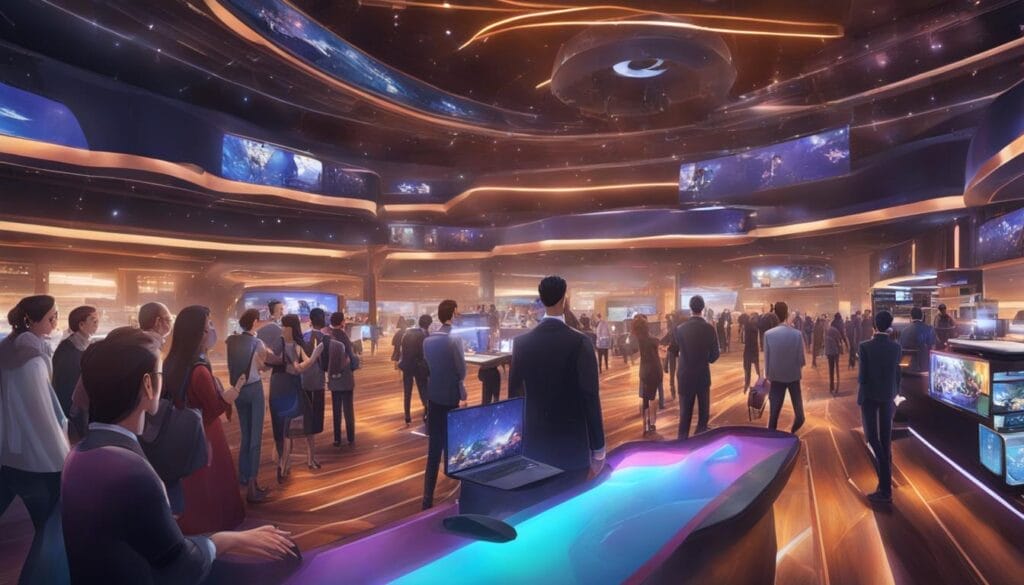Welcome to our comprehensive guide on monetizing metaverse events! The emergence of the metaverse has opened up exciting opportunities for businesses to generate revenue from virtual events and experiences. In this guide, we will explore strategies and best practices for effectively monetizing your metaverse events, along with real-life examples from Hyperspace, a leading platform in the metaverse.
Key Takeaways:
- Monetizing metaverse events offers businesses the chance to reach a wider audience and provide immersive experiences.
- Potential revenue streams include ticket sales, sponsorships, and selling virtual goods.
- Creating virtual products and services in the metaverse is a lucrative monetization strategy.
- An engaging in-world store design and effective promotion are crucial for successful monetization.
- Advertising within virtual environments and creating engaging metaverse advertisements can drive revenue.
The Benefits of Monetizing Metaverse Events
Monetizing metaverse events offers numerous advantages for businesses looking to generate revenue and maximize their profitability. With the increasing popularity of virtual events, tapping into this growing market can be highly lucrative. By leveraging various monetization strategies, businesses can tap into a wider audience base and provide a unique and immersive customer experience.
Reaching a Wider Audience
One of the key benefits of monetizing metaverse events is the ability to reach a wider audience. Unlike physical events with location constraints, virtual events have no geographical boundaries. This means businesses can attract attendees from all around the world, expanding their reach and potential customer base. With the right marketing and promotion, businesses can attract a diverse audience that may not have been accessible through traditional physical events.
Unique and Immersive Customer Experience
Another advantage of monetizing metaverse events is the ability to provide a unique and immersive customer experience. Virtual events in the metaverse can offer interactive and customizable experiences, allowing attendees to engage and participate in ways that enhance their overall experience. From virtual networking opportunities to personalized avatars and virtual environments, businesses can create memorable experiences that leave a lasting impression on attendees.
Diverse Revenue Streams
Monetizing metaverse events also opens up multiple revenue streams for businesses. Ticket sales are a primary source of revenue, with attendees purchasing tickets to access virtual events. Additionally, businesses can explore sponsorship opportunities, where brands can sponsor virtual events or have their branding integrated into the metaverse. Furthermore, virtual goods sales provide another avenue for revenue generation, allowing businesses to sell digital products and services within the virtual environment.
In conclusion, monetizing metaverse events offers several benefits for businesses, including reaching a wider audience, providing a unique customer experience, and diversifying revenue streams. By leveraging the opportunities presented by the metaverse, businesses can tap into the growing market of virtual events and maximize their profitability.
Creating Virtual Products and Services
The rise of virtual reality technology has opened up opportunities for businesses to create and monetize virtual products and services in the metaverse. By offering unique and immersive experiences, businesses can tap into a growing market and generate revenue through various monetization strategies.
Monetization Strategies for Virtual Products and Services
When creating virtual products and services, it’s essential to consider different monetization models to maximize profitability. Here are some effective strategies:
- Ticket Sales: Just like physical events, businesses can sell tickets to virtual experiences, such as virtual conferences, workshops, or live performances. By offering exclusive content and limited access, businesses can generate revenue while providing value to their audience.
- In-App Purchases: Many virtual platforms allow users to purchase virtual goods or upgrades within the metaverse. By creating and selling virtual products, such as clothing, accessories, or virtual real estate, businesses can generate revenue and enhance the user experience.
- Sponsorships: Partnering with brands or businesses that align with your virtual products and services can provide additional revenue opportunities. Businesses can offer sponsorships for virtual events, branded virtual items, or in-world advertising placements.
- Subscriptions: For ongoing virtual services or experiences, businesses can offer subscription plans, providing users with exclusive content, perks, and access. This recurring revenue model can help businesses establish a stable income stream in the metaverse.
When implementing these monetization strategies, businesses should also consider the overall user experience. Providing a seamless and enjoyable experience will not only attract more users but also increase the likelihood of them making purchases or engaging with virtual services. Additionally, regular updates and new offerings can help maintain user interest and keep revenue flowing.
An Example of Successful Virtual Product Monetization
“Our virtual fashion brand, VRStyle, has been incredibly successful in the metaverse. By creating unique and stylish virtual clothing items, we’ve been able to monetize our offerings through in-app purchases. Users can customize their avatars with our trendy virtual fashion pieces, allowing them to express themselves and stand out in the virtual world. Our virtual clothing line has become a popular choice among metaverse users, and we’ve been able to generate significant revenue through this innovative monetization model.”
As businesses continue to explore the metaverse as a revenue-generating platform, creating virtual products and services presents a promising opportunity. By implementing effective monetization strategies and providing a compelling user experience, businesses can tap into the growing market of virtual consumers and boost their revenue streams.
Best Practices for Setting Up an In-World Store
When it comes to monetizing your virtual events in the metaverse, setting up an in-world store can be a lucrative strategy. By creating an engaging store design, establishing a strong brand identity, and promoting your offerings effectively, you can attract virtual customers and boost your revenue. Here are some best practices to help you set up an in-world store that stands out:
1. Create an Engaging Store Design
The design of your in-world store plays a crucial role in attracting and retaining virtual customers. Consider incorporating visually appealing elements such as vibrant colors, interactive displays, and immersive environments. Use high-quality graphics and textures to enhance the overall aesthetic appeal. Organize your products in a logical and user-friendly manner, making it easy for customers to navigate and find what they’re looking for.
2. Establish a Strong Brand Identity
A strong brand identity is essential for success in the metaverse. Develop a unique and recognizable brand that resonates with your target audience. Use consistent branding elements such as logos, colors, and slogans across all your virtual assets, including your in-world store, virtual products, and advertisements. This will help customers identify and connect with your brand, leading to increased trust and loyalty.
3. Promote Offerings Effectively
No matter how great your products are, they won’t sell themselves. Promote your offerings effectively to drive sales in the metaverse. Leverage social media platforms, virtual events, and targeted advertising to reach your virtual audience. Consider partnering with influencers or hosting virtual demonstrations to showcase your products in action. Engage with your customers through virtual chat and provide exceptional customer service to build strong relationships.
By following these best practices, you can set up an in-world store that not only attracts virtual customers but also generates revenue for your business. Take advantage of the monetization opportunities in the metaverse and start earning from virtual ticket sales and other income streams today.
Successful Examples of In-World Products and Services
The metaverse has witnessed the rise of successful businesses that have monetized their offerings in creative and innovative ways. Let’s take a look at some notable examples of virtual products and services that have generated substantial event revenue and achieved digital monetization.
Virtual Clothing and Accessories
One flourishing sector in the metaverse is virtual fashion. With the increasing popularity of virtual events and social interactions, consumers are seeking virtual clothing and accessories to enhance their avatars’ appearances. Companies like Fabulous Fashion and Virtual Style have capitalized on this demand, offering a wide range of virtual outfits, accessories, and customization options. These businesses have established themselves as go-to destinations for fashion-conscious metaverse inhabitants, generating significant event revenue through virtual clothing sales.
Unique Virtual Experiences
Another lucrative aspect of the metaverse is providing unique and immersive experiences. Companies like Enchanting Escapes and Virtual Adventures offer virtual tourism and entertainment services, allowing users to explore virtual worlds, visit historical landmarks, and participate in thrilling adventures. By charging admission fees for these virtual experiences, these businesses have successfully monetized their offerings while providing users with unforgettable moments.
In-World Games and Applications
The gaming industry has also found great success in the metaverse, with various companies monetizing their in-world games and applications. For example, Epic Games’ Fortnite has evolved into a metaverse phenomenon, offering virtual events, concerts, and in-game purchases. These monetization strategies, such as selling virtual items and organizing exclusive virtual events, have contributed to Fortnite’s remarkable event revenue and digital monetization success.
| Company | Industry | Monetization Strategy | Event Revenue |
|---|---|---|---|
| Fabulous Fashion | Virtual Fashion | Selling virtual clothing and accessories | $500,000 |
| Virtual Style | Virtual Fashion | Offering customization options and virtual styling services | $750,000 |
| Enchanting Escapes | Virtual Tourism | Charging admission fees for virtual tours and experiences | $1,200,000 |
| Virtual Adventures | Virtual Entertainment | Offering immersive virtual adventures and experiences | $900,000 |
| Epic Games | Gaming | Selling virtual items, organizing virtual events | $10,000,000 |
These successful examples demonstrate the immense potential for event revenue and digital monetization in the metaverse. By offering virtual clothing, unique experiences, and engaging games, businesses can tap into the growing market of metaverse enthusiasts and generate substantial income. To thrive in this virtual realm, it is crucial for businesses to understand their target audience, provide high-quality offerings, and leverage effective marketing and monetization strategies.
Advertising Within Virtual Environments
In the metaverse, businesses have unique opportunities to generate revenue through advertising within virtual environments. By strategically placing advertisements in the virtual world, companies can reach a wide audience and maximize their virtual event income streams. Let’s explore some of the different advertising options available in the metaverse.
In-World Advertisements
One effective way to advertise within virtual environments is through in-world advertisements. These can take the form of billboards, posters, or interactive displays placed within virtual spaces. In-world advertisements allow businesses to showcase their products or services in an immersive and engaging manner, capturing the attention of virtual event attendees.
Virtual event income streams can be significantly boosted through in-world advertisements. By strategically placing ads in high-traffic areas, businesses can increase brand visibility and drive user engagement.
Virtual Events and Experiences
Another advertising option in the metaverse is promoting products or services through virtual events and experiences. Businesses can sponsor virtual concerts, conferences, or other immersive experiences, giving them the opportunity to display their branding and reach a captive audience. By aligning their brand with popular virtual events, companies can generate revenue while building positive brand associations.
Targeted Social Media Advertising
Social media platforms within the metaverse provide an additional avenue for advertising. Companies can create targeted advertising campaigns to reach specific demographics or interest groups. By leveraging user data and analytics, businesses can optimize their advertising efforts and maximize return on investment.
With these various advertising options available, businesses can tap into the potential of the metaverse to generate revenue and drive brand growth. By strategically utilizing in-world advertisements, sponsoring virtual events, and leveraging targeted social media advertising, companies can effectively reach their target audience and make the most of the virtual environment.
Best Practices for Creating Effective Metaverse Advertisements
The metaverse offers businesses a unique opportunity to reach their target audience through immersive advertisements within virtual environments. Creating effective metaverse advertisements requires a deep understanding of the target audience and utilizing data and analytics to measure success. By following best practices, businesses can create immersive and engaging advertisements that drive results and maximize digital monetization.
Understanding the Target Audience
Before creating metaverse advertisements, it is essential to have a clear understanding of the target audience. This involves conducting market research, identifying the demographics and interests of the target audience, and understanding their preferences within the metaverse. By gaining insights into the target audience’s preferences and behaviors, businesses can tailor their advertisements to resonate with them.
Utilizing Data and Analytics
Data and analytics play a crucial role in measuring the success of metaverse advertisements. Businesses should track key performance indicators (KPIs) such as click-through rates, engagement levels, and conversions to evaluate the effectiveness of their advertisements. By analyzing the data, businesses can identify areas for improvement and optimize their advertisements for better results. Additionally, A/B testing can be conducted to compare different variations of advertisements and determine the most effective approach.
Creating Immersive and Engaging Ads
Metaverse advertisements should be designed to provide an immersive and engaging experience for the audience. This can be achieved through visually appealing graphics, interactive elements, and compelling storytelling. By capturing the audience’s attention and encouraging interaction, businesses can increase the effectiveness of their advertisements and drive better results.
Monetizing Metaverse Experiences

The metaverse provides a boundless realm of possibilities for businesses to monetize virtual experiences. From immersive concerts to interactive games and virtual tours, there are various income streams for businesses to explore and capitalize on. By offering unique and engaging metaverse experiences, businesses can tap into a growing market and generate revenue from virtual events.
One popular way to monetize metaverse experiences is through virtual concerts. Artists and musicians can host live performances in virtual environments, attracting a global audience and selling virtual tickets to access the show. These virtual concerts provide a new and exciting way for fans to experience music, and businesses can earn income from ticket sales while delivering unforgettable experiences.
In addition to virtual concerts, businesses can also monetize immersive games within the metaverse. By creating captivating virtual game worlds and offering in-game purchases, companies can generate revenue from players who are willing to invest in virtual goods and experiences. This not only provides entertainment for gamers but also opens up monetization opportunities for businesses looking to tap into the growing gaming market.
Virtual tours are another metaverse experience that can be monetized. Whether it’s exploring a virtual museum, taking a virtual vacation, or visiting a virtual real estate development, businesses can charge for access to these immersive tours. By offering unique and exclusive virtual experiences, businesses can attract customers who are eager to explore and engage with the metaverse.
| Metaverse Experience | Potential Income Streams |
|---|---|
| Virtual Concerts | Sale of virtual tickets |
| Immersive Games | In-game purchases of virtual goods |
| Virtual Tours | Charging for access to exclusive experiences |
As the metaverse continues to evolve, businesses should consider the potential for monetizing virtual experiences. By leveraging the unique and immersive nature of the metaverse, companies can tap into new income streams and engage with a global audience. Whether it’s through virtual concerts, immersive games, or virtual tours, businesses have the opportunity to earn from virtual events and captivate customers in the ever-expanding metaverse.
Hosting Events in the Metaverse: A Comprehensive Guide
Hosting virtual events in the metaverse is a dynamic and exciting way to engage with audiences and generate revenue. This detailed guide will provide you with step-by-step instructions on planning and hosting successful events in the metaverse. From choosing the right platform to creating immersive experiences, we’ll cover all the essential aspects of virtual event monetization.
Choosing the Right Platform
When it comes to hosting events in the metaverse, selecting the right platform is crucial. Consider factors such as user base, features, and compatibility with your event goals. Platforms like Hyperspace offer a range of tools and customization options to create unique and immersive experiences for your audience.
Event Planning and Execution
Once you’ve chosen a platform, it’s time to plan your event. Determine your target audience, define your event objectives, and create a timeline. Whether it’s a virtual conference, concert, or exhibition, ensure that your event offers engaging content and interactive elements.
Create a registration process to collect attendee information and ticket sales. Utilize effective marketing strategies, such as social media promotion, email campaigns, and collaborations with influencers, to maximize event reach and ticket sales.
Creating Immersive Experiences
One of the key advantages of hosting events in the metaverse is the ability to create immersive experiences for attendees. Incorporate interactive elements such as virtual exhibits, live Q&A sessions, networking opportunities, and gamified experiences to keep participants engaged and entertained.
Collaborate with artists, performers, and content creators to curate unique experiences that align with your event’s theme or purpose. By providing attendees with memorable and interactive moments, you can enhance the overall value of your event and attract repeat attendees.
| Key Takeaways |
|---|
| 1. Choose the right platform that aligns with your event goals and target audience. |
| 2. Plan your event meticulously, defining objectives and creating a timeline. |
| 3. Utilize effective marketing strategies to promote your event and maximize ticket sales. |
| 4. Create immersive experiences by incorporating interactive elements and collaborating with artists and performers. |
By following these guidelines, you can effectively monetize your virtual events in the metaverse and provide attendees with unforgettable experiences. The future of event hosting lies in the virtual realm, so seize the opportunity to connect with your audience in innovative ways.
Virtual Real Estate and Monetizing the Metaverse

Virtual real estate has emerged as a valuable asset in the metaverse, offering businesses a unique opportunity to monetize their presence in virtual worlds. By renting out virtual spaces and establishing virtual online stores, businesses can tap into a range of monetization opportunities. In this section, we will explore the potential of virtual real estate and provide insights into how businesses can maximize their metaverse monetization.
Monetizing Virtual Spaces
One of the key ways to monetize virtual real estate is by renting out spaces within the metaverse. Just like in the physical world, businesses can offer virtual spaces for lease, allowing other users to set up their virtual stores, exhibits, or experiences. This can provide a steady stream of income for the property owners while also fostering a vibrant and interactive metaverse community.
Virtual real estate can take various forms, ranging from virtual storefronts to event spaces. Businesses can set rental fees based on factors such as the location, size, and popularity of the virtual space. For example, prime locations near popular landmarks or high-traffic areas may command higher rental rates. By carefully curating and managing their virtual spaces, businesses can attract tenants and generate a recurring revenue stream.
Establishing Virtual Online Stores
In addition to renting out virtual spaces, businesses can create their virtual online stores within the metaverse. These stores can offer a wide range of virtual products and services, catering to the diverse interests and needs of the metaverse community. From virtual fashion and accessories to digital art and collectibles, the possibilities for virtual online stores are endless.
By establishing a virtual online store, businesses can tap into the growing market for digital goods and experiences. They can leverage the immersive nature of the metaverse to create unique and engaging shopping experiences, attracting customers with interactive displays, limited edition items, and virtual events. Virtual online stores provide businesses with a platform to showcase and monetize their offerings, further expanding their revenue streams in the metaverse.
| Benefits of Monetizing Virtual Real Estate | Challenges of Monetizing Virtual Real Estate |
|---|---|
|
|
Monetizing virtual real estate in the metaverse presents both opportunities and challenges for businesses. By understanding the potential benefits and overcoming the associated challenges, businesses can establish a profitable presence in the metaverse and unlock the full potential of virtual real estate.
Next, we will explore different strategies for monetizing metaverse events and dive deeper into the world of virtual event monetization.
Monetizing the Metaverse through Virtual Events and Services
Earning revenue from virtual events is a promising opportunity in the metaverse. Businesses can capitalize on the growing popularity of virtual experiences by charging admission fees and offering virtual products and services. In this section, we will explore different strategies to monetize virtual events and services in the metaverse, providing you with valuable insights to maximize your earning potential.
Virtual Event Income Streams
When it comes to virtual events, there are various income streams to consider. One of the most straightforward ways to generate revenue is through ticket sales. By offering exclusive access to virtual events, businesses can attract attendees and monetize the experience. Additionally, businesses can sell virtual products and services related to the event. For example, a virtual conference may offer digital merchandise, virtual swag bags, or access to exclusive content.
Another lucrative income stream is sponsorships. Businesses can partner with brands interested in targeting the virtual event’s audience, providing opportunities for sponsored content, virtual booths, or branded experiences. Sponsorships not only generate revenue but also enhance the overall event experience for attendees.
Diversifying Revenue with Virtual Services
Virtual events provide a gateway to offer additional services that can boost your monetization efforts in the metaverse. For instance, businesses can leverage virtual event platforms to offer event planning and management services to other organizations. By providing a seamless and immersive event experience, businesses can charge a fee for their expertise and assistance. Virtual event platforms can also serve as a marketplace for businesses to sell their services, such as virtual event production, marketing, or technical support.
Furthermore, businesses can explore partnerships with virtual influencers or content creators to offer personalized experiences or endorsements. This can include virtual meet-and-greets, personalized shoutouts, or branded virtual experiences. By diversifying revenue streams with these virtual services, businesses can maximize their earning potential in the metaverse.
| Income Stream | Description |
|---|---|
| Ticket Sales | Earn revenue by selling exclusive access to virtual events. |
| Virtual Products | Monetize virtual events by selling digital merchandise or exclusive content. |
| Sponsorships | Partner with brands for sponsored content, virtual booths, or branded experiences. |
| Event Services | Offer event planning, management, or production services to other organizations. |
| Virtual Influencer Partnerships | Collaborate with virtual influencers for personalized experiences or endorsements. |
The metaverse offers a wealth of opportunities for businesses to monetize virtual events and services. By tapping into multiple income streams and providing unique experiences, businesses can establish a profitable presence in the metaverse. As the virtual event landscape continues to evolve, staying adaptable and innovative will be key to successfully monetizing the metaverse.
Conclusion
The metaverse presents an exciting frontier for businesses to make money from virtual events. By embracing various monetization models, such as ticket sales, sponsorships, virtual goods sales, and advertising, businesses can tap into the vast potential of the metaverse to generate revenue and maximize their virtual event monetization.
With the rise in popularity of virtual events, it’s crucial for businesses to stay ahead of the curve and explore the opportunities provided by the metaverse. Whether you’re hosting a virtual concert, organizing an immersive game, or offering virtual tours, there are endless possibilities to monetize these experiences and attract a global audience.
Virtual real estate also plays a significant role in the metaverse, providing businesses with the chance to monetize spaces and establish virtual online stores. By renting out virtual properties and creating engaging in-world experiences, businesses can unlock new revenue streams and create a thriving presence in the metaverse.
So, if you’re looking to make money from virtual events, now is the time to embrace the metaverse and its potential. With the right strategies in place, you can turn your virtual events into profitable ventures and captivate audiences in ways that were once unimaginable. Explore the monetization models available, experiment with different approaches, and embark on a journey of virtual event success in the metaverse.
FAQ
What is the metaverse?
The metaverse is a virtual reality space where individuals can interact with each other and digital objects in real-time.
Why should businesses monetize metaverse events?
Businesses can reach a larger audience and provide a unique and immersive customer experience through virtual events in the metaverse.
How can businesses generate revenue from metaverse events?
Businesses can generate revenue through ticket sales, sponsorships, and sales of virtual goods during metaverse events.
What are some strategies for creating virtual products and services in the metaverse?
Businesses can create in-world products and services in the metaverse through virtual reality technology and innovative design.
How can businesses establish a strong in-world presence in the metaverse?
Businesses can establish a strong in-world presence by designing engaging stores, establishing a brand identity, and effectively promoting their offerings.
Can you provide examples of successful virtual products and services in the metaverse?
Popular examples include virtual clothing and accessories, unique virtual experiences, and in-world games and applications.
How can businesses advertise their products and services in the metaverse?
Businesses can advertise through in-world advertisements, virtual events and experiences, and targeted social media advertising.
What are some best practices for creating effective metaverse advertisements?
Best practices include understanding the target audience, utilizing data and analytics, and creating immersive and engaging advertisements.
Can businesses monetize virtual experiences in the metaverse?
Yes, businesses can monetize virtual experiences such as virtual concerts, immersive games, and virtual tours.
How can businesses plan and host events in the metaverse?
Businesses can follow a detailed event planning guide, learn from successful metaverse event examples, and stay updated on VR and AR event planning trends.
How can businesses monetize virtual real estate in the metaverse?
Businesses can monetize virtual real estate by renting out spaces and starting virtual online stores.
What are some ways to monetize virtual events and services in the metaverse?
Businesses can monetize virtual events and services by charging admission fees and selling virtual products and services.
How can businesses maximize their metaverse monetization?
By leveraging various strategies such as ticket sales, sponsorships, virtual goods sales, and advertising, businesses can generate revenue and maximize their metaverse monetization.





